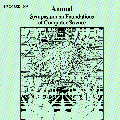While the search for quantum advantage typically focuses on speedups in execution time, quantum algorithms also offer the potential for advantage in space complexity. Previous work has shown such advantages for data stream problems, in which elements arrive and must be processed sequentially without random access, but these have been restricted to specially-constructed problems [Le Gall, SPAA `06] or polynomial advantage [Kallaugher, FOCS `21]. We show an exponential quantum space advantage for the maximum directed cut problem. This is the first known exponential quantum space advantage for any natural streaming problem. This also constitutes the first unconditional exponential quantum resource advantage for approximating a discrete optimization problem in any setting. Our quantum streaming algorithm $0.4844$-approximates the value of the largest directed cut in a graph stream with $n$ vertices using polylog$(n)$ space, while previous work by Chou, Golovnev, and Velusamy [FOCS '20] implies that obtaining an approximation ratio better than $4/9 \approx 0.4444$ requires $\Omega(\sqrt{n})$ space for any classical streaming algorithm. Our result is based on a recent $\widetilde{\text{O}}(\sqrt{n})$ space classical streaming approach by Saxena, Singer, Sudan, and Velusamy [FOCS '23], with an additional improvement in the approximation ratio due to recent work by Singer [APPROX '23].
翻译:暂无翻译




